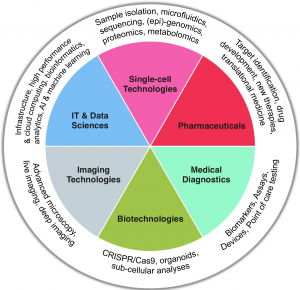LifeTime started as the shared vision of leading scientists at over 50 renowned organizations across Europe, who selected 18 partners to submit the proposal.
The LifeTime EU grant consortium receives funding from Horizon 2020 for a one year Coordination and Support Action (CSA) to prepare a roadmap for a large scale research initiative. It now consists of 17 Beneficiaries and 3 linked third parties in 15 countries.
LifeTime scientists are world leaders and pioneers in the key disciplines required to fulfill our vision. Our Initiative is the result of the merging of several research communities in Europe including single-cell biologists, computer scientists, mathematicians, clinicians, pathologists, imaging experts and physicists. Individually, we have made seminal scientific contributions. Together, and with our industrial partners, we will synergise and develop a unique collective network.

Many interdisciplinary challenges must be tackled to achieve our vision, for example:
a) single-cell genomics must be integrated with smart imaging to deliver clinical-grade single-cell pathology with high spatial resolution;
b) computational models for deriving predictive models from electronic health records must be integrated with AI models of gene function and big data from multi- omics analysis of single cells;
c) novel organoid technologies must be profiled at single-cell resolution and optimised given computational modelling of human samples, then serve as ideal vehicles for perturbation analysis using CRISPR-Cas technologies and targeted drug screens;
d) finally, suitable in vivo models should be generated based on these data and used to determine causality in intact organisms.
By leveraging the continuous decreasing costs in computing power, DNA sequencing, multi-omics technologies and advanced imaging, LifeTime will ensure that we can move quickly from researching solutions for these key challenges towards innovation and implementation of cost-effective and scalable instruments, products and services.